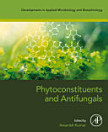Antibiotic Resistance and Nanotherapy
About this ebook
About the author
Dr. Awanish Kumar is currently an Associate Professor in the Department of Biotechnology at the National Institute of Technology, Raipur (CG), India. He has more than 13 years of research experience. He received his PhD in molecular parasitology from the CSIR-Central Drug Research Institute, Lucknow, India, and Jawaharlal Nehru University, Delhi, India, and completed his postdoctoral studies at McGill University, Montreal, Canada. His research interests are infection biology, drug targeting, and drug discovery. He has served on various national and international organizations in different academic and research capacities. He has also served on many national committees and scientific advisory panels, as a member of many international professional research societies, and as a reviewer and editorial board member of reputed and refereed journals. He has authored or edited several monographs, books, and book chapters.
Dr. Sharda Bharti currently an Assistant Professor in the Department of Biotechnology at the National Institute of Technology (NIT), Raipur, India, an institute of national Importance under the Ministry of Education-Government of India. She completed her M. Tech and Ph.D. in Environmental Science and Engineering from the Indian Institute of Technology (IIT) Bombay, Mumbai, India. Her research interests primarily focus on the application of nanomaterials in water disinfection, water and wastewater treatment, antimicrobial resistance, and environmental health and safety. She has more than three years of experience in teaching and in industry. She also serves as reviewer for several reputed journals: Applied Nanoscience, The Institute of Engineers: Series A, Heliyon, Arabian Journal of Chemistry and a few others. She has more than 15 publications in different reputable international journals and conference papers, several book chapters in books of international repute, and has presented papers at several national and international conferences.






